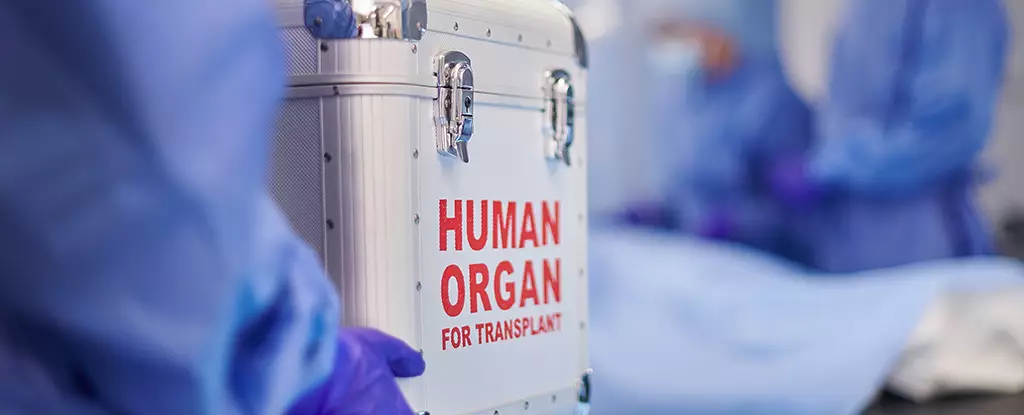Organ transplantation stands as one of the most pivotal advancements in modern medicine, offering life-saving solutions to patients with terminal organ failure. However, a deeply concerning incident in Kentucky has thrust the delicate protocols surrounding organ donation into the spotlight, igniting a crucial debate about what constitutes death and the ethical ramifications of organ procurement. In this context, the case of Anthony Thomas “TJ” Hoover II—who reportedly awoke during an organ procurement procedure—has alarmed both the public and medical professionals alike, raising significant questions about the safeguards in place to protect patients.
The incident involving TJ Hoover dates back to October 2021, following a tragic overdose that led to cardiac arrest. Declared brain dead, TJ was prepared for organ donation, a decision made according to his family’s wishes. However, as surgeons prepared to harvest organs, a shocking turn of events unfolded: TJ exhibited signs of life while on the operating table. Witness accounts describe TJ “thrashing around” and even “crying visibly,” prompting medical personnel to halt the procedure. Whistleblower Nyckoletta Martin, formerly of Kentucky Organ Donor Affiliates (KODA), highlighted this disturbing situation in a communication to the U.S. House of Representatives, emphasizing the profound implications of such an error on public trust and ethical medical practice.
Protocol Gaps and Ethical Implications
This case invites scrutiny of the procedures used to declare brain death and the criteria that govern organ donation. Medical professionals often rely on a stringent set of criteria to confirm brain death; however, the apparent misjudgment in TJ’s case raises critical concerns. Was the assessment of his neurological state rigorous enough? Martin’s assertions that TJ’s condition should have prompted further evaluation underscore a potential shortcoming in operational protocols. The concept that a patient could be alive during such an invasive procedure is unspeakably horrifying—not only for the individuals involved but also for the broader community that depends on the ethical integrity of healthcare systems.
Moreover, the chaotic response from the surgical team is indicative of a systemic issue within organ procurement protocols. With KODA claiming that operational directives were followed, yet a surgeon expressing reluctance to proceed, an alarming disconnect emerges. Questions about accountability, communication, and ethical practices loom large, with the potential for reform becoming more pressing than ever before.
The Public’s Confidence at Stake
One of the most detrimental outcomes of this incident could be its impact on public perception of the organ donation system. Trust in medical institutions relies heavily on their ability to manage delicate situations with precision and ethical consideration. If the public begins to believe that such catastrophic mistakes could occur, it could lead to hesitancy in donating organs, ultimately resulting in more lives lost in the waiting game for transplants.
Public confidence is further undermined by the realities of the transplant waiting list, which currently stands at around 100,000 individuals. With only approximately 46,000 transplants successfully performed each year, the gap between need and supply becomes glaringly evident. Inevitably, the policy decisions made in light of this alarming case will affect not only immediate victims but also those waiting for a chance at life through transplantation.
As it stands, the Health Resources and Services Administration is conducting an investigation into the incident. This inquiry must not only seek to understand the failures in this particular case, but it should also serve as a catalyst for systemic reform. The United States organ transplant system currently faces challenges—including long wait times, disparities in access, and high rates of organ wastage—that require urgent attention. Addressing these concerns through transparent practices and unwavering ethical standards is imperative to avoid future tragedies like TJ’s.
The broader implications of this incident go beyond a single case. They invite medical ethicists, healthcare providers, and lawmakers to rethink policies, recalibrate guidelines, and reaffirm their commitment to patient safety above all else. A patient’s life is far too precious to be treated as a mere statistic or a means to an end, and the recent events serve as a crucial reminder that medical practice must be grounded in compassion, rigor, and ethical integrity.
Ultimately, the saga of TJ Hoover extends beyond the confines of a healthcare facility; it is a clarion call for change, underscoring the need for robust safeguards that ensure ethical standards in organ donation are not just met, but consistently exceeded. In honoring the sanctity of human life, it is essential that the system work diligently to renew trust among those it serves, acknowledging that every case is indeed a matter of life and death.


Leave a Reply